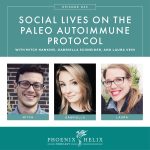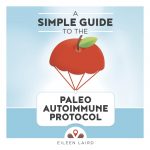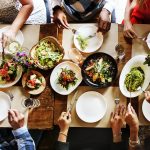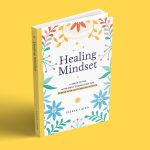Not Footloose and Fancy-Free
I’m 46 years old, and I was diagnosed with rheumatoid arthritis at 43. When I was in my teens and twenties, I was living on ramen noodles and bricks of Cracker Barrel cheese, pulling all-nighters to either study or party, and my health was not my top priority. My three guests have a very different life experience. They were all diagnosed with their autoimmune disease at a young age, and they chose the impressive path of healing through diet and lifestyle. Today, we’ll be talking about the blessings and challenges of living an AIP life when you’re young and single.
Listen to the Show
- Subscribe to my podcast through your favorite podcast app: iTunes, Stitcher, Google, TuneIn, Spotify, Amazon, etc.
- You can also listen to the episode right here through the player below, and if you subscribe to my newsletter you’ll get notified of future episodes.
Podcast: Play in new window | Download
Show Notes
- Intro (0:00)
- Meet Our Guests (0:51)
- Shannon Keating is the blogger behind Nutrition Uplifted. She’s 22 years old, in college, and developed bodywide psoriasis at age 20. Interestingly, she was paleo at the time. It wasn’t until she started focusing on nutrient-density and added the autoimmune protocol that her psoriasis healed. Now, all that remains are a few small scars on her legs.
- Kat Cline is the blogger behind The Primordial Table. She’s 26 years old, works as a hair stylist, and has psoriasis, psoriatic arthritis, and endometriosis. Her psoriasis symptoms first appeared at age 22 in a mild form, and then became severe at age 24, resulting in hair loss and joint pain as well. Like Shannon, Kat was paleo when her symptoms appeared, and it wasn’t until she went AIP that they started to improve. Nightshades are a big trigger for her, and so is stress.
- Kari Owens is the blogger behind Kari Owens. She’s 24 years old, works as a consultant, and was diagnosed with ankylosing spondylitis at age 15. Her progression of symptoms was swift, and she was disabled within 3 months. She was put on biologic immunosuppressant medication which put her into remission. However, over the years, remission came and went, and eventually her symptoms worsened in spite of medication. That’s when she tried paleo. The regular paleo diet alleviated her pain, but tests showed that her disease was still progressing. She’s now following the AIP with a focus on nutrient density. Her hope is that she will achieve complete remission. She is currently medication-free.
- Dealing with Roommates (20:14)
- Shannon: Have an understanding that you each buy your own food. When it comes to junk food temptations, she doesn’t see that as food any more and doesn’t crave it.
- Kat: Type up a list of kitchen rules and post it on the fridge. They don’t need to understand why; they just need to know it’s important to your health, and that’s an easy reference of dos and don’ts. If you are the one interviewing for roommates, also put those rules in the roommate agreement.
- Kari: Her paleo roommate was her father. She was the cook, and he willingly ate paleo meals.
- Dating Decisions (27:25)
- Kari: When she was younger, she wasn’t comfortable sharing her diagnosis. For the past year, she consciously stopped dating, to focus on her own health and make herself a priority. Now, she’s becoming interested in dating again, but it’s a vulnerable feeling, putting herself out there.
- Kat: Some guys thought her diet made her too high-maintenance, so she tends to wait to share that information for a few dates in. She’s actually had good luck with men who have dated vegetarians or vegans in the past, because they’re used to different diets and are just excited you still eat meat. A guy’s attitude toward your diet is a good screening tool for whether they are worth your time.
- Shannon: Like Kari, she also took some time off dating to focus on herself and healing. She also wanted to gain confidence about being paleo and be able to talk about comfortably, before sharing her choice with others. Now, she has a boyfriend. She didn’t tell him about her diet until they got more serious. She chose paleo-friendly restaurants for their dates.
- Friendships (37:08)
- Shannon: Her friends are supportive of her choice to heal through diet and lifestyle, but it’s hard to be in your 20’s, and go to bed early, and turn down alcohol, when everyone else is doing the opposite. It helps if you have one friend willing to stay sober with you.
- Kari: Sharing her autoimmune diagnosis with friends, and their seeing its impact on her life, deepened their friendship. They were very supportive when she decided to go paleo to feel better. However, it’s hard for other people to really “get it.” Kari now plans their friendship “dates” for things that don’t involve food, like exploring parks, or even typical tourist activities she wouldn’t normally do, but are a lot of fun. She took her friends on an airboat ride to see alligators, and they loved it.
- Kat: Some of her friends tease her, but they also accept her diet as part of who she is. While not all of her friends understand, she chooses to spend time with the ones who do. Two favorite activities are shopping or playing pool, and Kat brings her own snacks. She also joined a “crunchy” group that is full of all-natural people who understand food intolerances. They hold potlucks with ingredient cards in front of each dish, so everyone knows what food is safe for them to eat.
- Paleo on a Budget (48:19)
- Kat: She bought a second-hand deep freezer, and when something goes on sale, she buys in bulk. She gardens, which results in fresh, cheap, organic veggies. She knows which stores sell which foods the cheapest in her town, and shops accordingly.
- Kari: Her menu plans are tentative, and she’ll change it based on what she finds on sale. She also notes that the most expensive paleo ingredients are things like special flours and paleo packaged goods. She stays away from those and puts her money toward high-quality meats and vegetables.
- Resource article: 12 Tips for Eating Paleo AIP on a Budget.
- Paleo at College (52:24)
- Shannon: In the dining hall, focus on filling your plate with meat, vegetables and fruit. The salad bar is a great choice. For cooked vegetables, choose steamed over sauteed, to limit your refined oils. In your room, keep a stash of canned seafood. You can cook sweet potatoes and spaghetti squash in the microwave. Stock some healthy fats. Jerky also makes a great snack. And keep some raw fruits and veggies in a small fridge. Do the best you can.
- Surviving a Flare Alone (54:30)
- Kari: Draw on whatever support network you have. Remind yourself of what is going right in your life, and that you aren’t completely defined by your disease. It’s a good time for a gratitude journal.
- Kat: In the middle of a flare, it can feel overwhelming to take care of yourself. Plan ahead and stock your freezer with bone broth, soups, and emergency meals, so you can just defrost them and have healing food at your fingertips.
- Resource: Autoimmune Connection Video Series (Both Kat and Kari were interviewed for the Arthritis episode).
- Blessings (1:01:08)
- Kat: She started the AIP to reverse autoimmune disease, but it stabilized her mood issues at the same time. She’s much happier than she’s ever been. She’s also grateful she halted the progression of her autoimmune disease before it became disabling.
- Kari: After 10 years of living with autoimmune disease, she feels she understands her body better than ever before, and it’s empowering to take her health into her own hands. She also likes being part of a community of people doing the same; she no longer feels isolated by her disease.
- Shannon: Starting this lifestyle so young sets her up for abundant health later in life. She also likes being a role model for other young people, showing them an alternative path to healing that doesn’t involve medication.
- Outro (1:06:04)
- Kat blogs at The Primordial Table.
- Kari blogs at KariOwens.com.
- Update 2020: Shannon is now a women’s empowerment coach, and you can connect with her through Instagram or Facebook.
- Eileen (your podcast host) is the author of multiple books, written to help people thrive with autoimmune disease. Learn more on the Books Page.
- If you like this podcast, follow or subscribe through your favorite podcast app. You can also subscribe to Eileen’s biweekly newsletter.
- Check out the entire archive of podcast episodes.
You May Also Be Interested In
Spreading the Word
If you like the podcast, please leave a positive review in iTunes. It would mean the world to me, and also helps others find the podcast. Here are some quick instructions using your iPhone:
- If you are already subscribed to my podcast: (1) Click the purple podcast icon. (2) At the bottom of the screen, click Library. (3) At the top of the screen, click Shows. (4) Click the Phoenix Helix podcast image. (5) Scroll down the page, and you’ll see Ratings and Reviews. Scroll down a little bit more and click on Write a Review. This will bring up the review screen. Tap 5 stars (if you love the podcast), and then click in the title box, and it will bring up the keyboard. Enter a title and short review. (6) Click Send in the upper right corner. (7) Thank you! Positive reviews give the podcast a higher search ranking in iTunes, helping people find it and letting them know it’s a quality podcast and worth their time to listen.
- If you haven’t subscribed to my podcast: (1) Click the purple podcast icon. (2) In the lower right corner, click the magnifying class. (3) Type Phoenix Helix in the search box. (4) Click the podcast cover in the Show list. (5) If you’d like to subscribe, click the + sign at the top of the screen. (6) To write a review, scroll down the page, and you’ll see Ratings and Reviews. Scroll down a little bit more and click on Write a Review. This will bring up the review screen. Tap 5 stars (if you love the podcast), and then click in the title box, and it will bring up the keyboard. Enter a title and short review. (7) Click Send in the upper right corner. (8) Thank you! Positive reviews give the podcast a higher search ranking in iTunes, helping people find it and letting them know it’s a quality podcast and worth their time to listen.










Thanks for your replies Kat and Shannon. 🙂
I really enjoyed this episode. I may not be young, but I am single and I could identify with so many of the issues brought up. Especially talking about dating. When I first met the guy I’m dating now I was scared to seem to high maintenance so I just ordered simply the first time we went out. Turns out, he’s a crossfit coach and although he doesn’t eat paleo (mainly b/c he has no time to cook), but totally gets it and usually chooses the more paleo options when we go out together. He no longer even looks at me funny when I order a burger on a plate with some steamed veggies.
Thanks for sharing your experience, Bethany!
Thanks for doing this podcast 🙂 Just to add to the dialogue, there is a gluten free dating site: http://www.glutenfreesingles.com. It would be absolutely amazing to have a really functional site though that worked for finding roommates too.
Also, I would have to agree that it is easier to date guys who at least dabble in things like Raw Veganism, Paleo, or gluten free. It’s just so much easier when they have some prior knowledge of what at least gluten is.
How do you all deal with preventing cross contamination via kissing? Particularly when dealing with high reactivity to all AIP and gluten cross reactive foods…. :/
Thanks for sharing that website, Susanne! In terms of the kissing question, my husband eats gluten and I’ve never had a problem with having a reaction when we kiss. However, I’m not celiac. Angie from Autoimmune-Paleo is celiac, and her husband knows to brush his teeth before kissing her, if he’s had gluten. However, neither of us set the bar that high in terms of other foods. For example, I’m crazy intolerant to nightshades and dairy, and my husband eats both, and again – no reaction. I sent an email to the podcast panel, to ask about their experience. Interesting topic! Have you personally had a food reaction from kissing, or are you just thinking ahead?
Great to hear about the gluten free dating site, and it would be great to know if anyone has experience with it too. And really interesting about the kissing question, I always wondered about that too.
Yes unfortunately I have had a reaction from a kiss (one such reaction currently in progress). I am the sort of sensitive Celiac that I have to make sure that nothing in, on, or around the mouth of any kissing partner contains gluten, grains, soy, dairy, etc. It’s a nightmare. I’ve not been able to get my hands on any yet, but I saw Dr Tom O’Bryan writing a post about how Glutenza might provide some sort of protection in such situations of accidental glutening in small amounts (he stressed it was not a licence to go out and binge on gluten). Has anyone tried that? Something of that sort at least might allow us the freedom to have that first kiss when we want to, without having the gluten/disease disclosure talk first. I’ve connected with a few great guys through the site I mentioned, but also a few that I had nothing in common with other than Celiac Disease. Not everyone there has the same approach also. Of the men I’ve dated since diagnosis, one was amazing and responsible for himself and wouldn’t kiss me unless he was certain it was safe. The others, however, have not been as on top of it for lack of a better way to say it. I tended to have more symptoms during those relationships, which I trace back to gluten via kissing. I’ve also encountered women who react to other bodily fluids from a person who has ingested something they are allergic to. So. Much. Fun.
Wow, Susanne, this is really helpful and illuminating, and I can so relate now that I look back on some of the flares (psoriasis and psoriatic arthritis) I’ve had while being in relationships. I haven’t tried Glutenza, but I have tried the gluten/dairy digest formula from Pure Encapsulations that seemed to help. And thanks for the feedback about the site, very helpful.
Hey Susanne!
I definitely don’t have your level of sensitivity, but I’m always super careful anyways. My gluten sensitivity is very high for someone who is non-celiac and my nightshade sensitivity is ridiculous. For that reason, I’ve found that I have to have the gluten/nightshade disclosure before kissing. Yes, it’s frustrating and goes back to my article about wanting to feel normal even when we aren’t (See “Raw Truth about Living AIP” on my blog), but it’s something that I’ve maintained is important to my health and the right person WILL understand that. Yes, it does mean that we cut through a lot of BS right at the get-go when dating, and sometimes this can make us feel like our standards are “too high” or we’re being “too difficult” or “too picky”. The truth is that we aren’t. It takes a lot of courage and strength to do what we do every day in a society that is blatantly unopen to food as healing versus medicine. I’ve only recently started seeing someone, and on day two had to turn down steak cooked at his house because it was covered in nightshades. I was very polite and explained that I couldn’t have it, but that the rest of the meal looked amazing and I was looking forward to it. He asked why I couldn’t enjoy the steak and then genuinely felt bad that I could eat it. I had to reassure him that he didn’t know and it wasn’t his fault. I would love to see things go somewhere, but regardless of what the future holds with him specifically, his presence and acceptance has shown me that there ARE men out there who do care and who will take time to understand even if it doesn’t make sense to them. We just have to do a LOT of extra digging to find them, but won’t they be so much more worth it in the long run?
I know that’s not the easy answer, but I hope that helps somewhat! Thanks so much for listening and feel free to send any other questions my way!
Hi Susanne! I’ve never experienced a reaction while kissing my boyfriend who definitely eats his fair share of gluten buut I’m also do not have celiacs. I DO however have the Glutenza you’ve spoken about and I would recommend trying it! It’s definitely a good tool to have on hand in your purse in the case of accidental exposure upon eating out – you can take it up to 3-4 hours after an accidental exposure and it will help pulverize the gluten proteins before they reach your intestine and start causing damage.
Thank you for a timely post as I am trying to advise a college student on some helpful changes to deal with her GERD, PCOS, depression, chronic fatigue and pain, and a few other things. She’s willing to make changes, but the biggest challenge is working around the realities of college dorm life.
Synchronicity!
This is really great as I am in college at the moment. One question i have is how do you cope without coffee? As a former coffee addict I am really struggling. I have tried to reintroduce, but have has an flare each time.
Helen,
I too am a former coffee addict but found that after experimenting with quitting it completely in November many of my symptoms (of psoriasis and psoriatic arthritis) improved (especially my skin), so I’ve stayed off of it for now. But now I’m a green tea addict.
Here’s an article from a fellow coffee addict, which includes a recipe for a coffee substitute: http://sweetpotatoesandsocialchange.com/herbal-coffee-aip-friendly-coffee-alternative/
Hi Helen – I agree with the ladies above! Try out some teas until you find one that you particularly like and then use that as your replacement. I love the Dandelion Detox one by Yogi Teas, and I know there are tons of other Dandelion blends available for sale now too that have a sense of coffee taste to them. And a bonus if you have a magic bullet, add a bit of cinnamon, coconut oil, and honey and turn it into a frothy “bulletproof” concoction 😉
I love the bulletproof idea, Shannon! And Helen, I have one more resource for you. Stacy from The Paleo Parents was raving about this herbal “coffee” from Delicious Obsessions, saying it tastes just like the real thing: http://bit.ly/1zH6B1S
This was really helpful, thanks, especially the discussion about dating with autoimmune conditions, which applies to people of all ages too. Definitely can make an already potentially awkward situation even more complex, but nice to hear about others going through it. Love the idea of having some kind of dating service/online/something for folks who are gluten-free or on the AIP, and meeting people who are accepting, supportive, and respectful of this lifestyle. Perhaps it will naturally evolve through these great blogs and people like you all, thanks again.
That would be great! So glad you liked the podcast, Felicia.